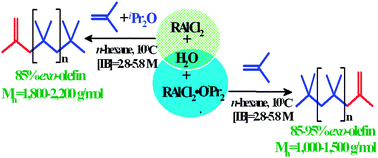Alkylaluminum dichloride–ether complexes which are fully soluble in hydrocarbons as catalysts for the synthesis of exo-olefin terminated polyisobutylene at room temperature†
Abstract
The cationic polymerization of isobutylene using RAlCl2 × nOiPr2-based initiating systems (R = Me, Et, iBu; n = 0.6–1) in non-polar n-hexane at 10 °C and with high monomer concentrations ([M] = 2.8–5.8 M) has been investigated. Among the complexes of alkylaluminum dichlorides with diisopropyl ether the best results in terms of exo-olefin content and monomer conversion were obtained with EtAlCl2 × nOiPr2 and iBuAlCl2 × nOiPr2 where n = 0.8–0.9. These initiating systems afforded polyisobutylenes with the desired low molecular weight (Mn = 1000–1500 g mol−1) and high exo-olefin terminal group content (85–95%) in a moderate yield (30–60%). The use of a “delayed proton abstraction” approach, i.e. when the polymerization of IB is co-initiated by RAlCl2 and separately added ether, allowed an increase in both the reaction rate and the ultimate monomer conversion (70% in less than 15 min), while the exo-olefin end group content remained high (85%). In addition, RAlCl2 × OiPr2-based initiating systems showed high activity and selectivity towards the polymerization of mixed C4 feed.


 Please wait while we load your content...
Please wait while we load your content...